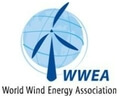News Release from World Wind Energy Association e.V. (WWEA)
Wind Industry Profile of
Wind Power as Primary Solution for Pakistan’s Power Crisis
At a conference “Scaling-up Wind Power Deployment for Pakistan's Sustainable Energy Future”, jointly organized by WWEA, Alternative Energy Development Board and Heinrich Böll Foundation Pakistan, 100 participants from government, business, academia and NGOs discussed how Pakistan can progress faster in wind power deployment in order to encounter its current energy crisis.
High-level speakers included Planning, Development and Reforms Minister Prof Ahsan Iqbal; Mr Asjad Imtiaz Ali, CEO of the Alternative Energy Development Board; Dr Miftah Ismail, CEO of the Board of Investment; Mr Werner Liepach, Country Director of the Asian Development Bank; Mr Peter Felten, Deputy Ambassador of Germany; Ms Saima Jasam, HBS Country Director; WWEA Honorary Vice President Air Marshall (rtd) Shahid Hamid and WWEA Secretary General Mr Stefan Gsänger.
All speakers highlighted the benefits of renewable energy in general and of wind power in particular, in order to encounter Pakistan’s current and severe power crisis. Especially wind power could contribute fast and at low cost to supply electricity to the national grid and to reduce the need of load shedding in the country which has currently a lack of 5'000 MW of electricity generation capacity. Wind power could also help to electrify thousands of villages in rural areas as a least-cost option.
In this context, the socioeconomic advantages of wind power were highlighted: Minister Ahsan Imtiaz underlined that “renewable energy is energy of people” and offers especially huge benefits for local communities. He pointed out that “no corporate entity, no government can put monopoly on wind".
However, in spite of a comprehensive support scheme for wind farms, the market for wind turbines in the Pakistan is still very small. In order to identify the barriers which are blocking wind power investment, WWEA in cooperation with HBS had commissioned a study based on a survey amongst wind power investors in the country. Mr Sohaib Malik, Researcher at WWEA, presented the main findings of the survey, and further speakers as well as other participants discussed conclusions and necessary steps forward.
Four areas for action were identified which need to be addressed: Policy and regulation, technology, finance and socioeconomic impact. Many participants suggested improvements of the way wind power policies have been deployed and requested more clarity and better coordination amongst different units. Also grid connection problems were often mentioned, together with challenges to find banks willing to finance wind power investment. At the same time, many speakers underlined the huge potentials of wind energy to empower local communities.
Stefan Gsänger, WWEA Secretary General: “Wind power can become very fast the affordable solution for Pakistan's power supply problems. And it can also help rural and urban communities to improve their living conditions and have sufficient access to energy. Wind power is affordable, and wind and sun are practically available everywhere. Hence, the future of Pakistan must be 100 % renewable energy.”
The final report of the survey and conference will be published in summer and will include recommendations for policymakers on how to accelerate wind power deployment.
- Source:
- WWEA
- Email:
- info@wwindea.org
- Link:
- www.wwindea.org/...
